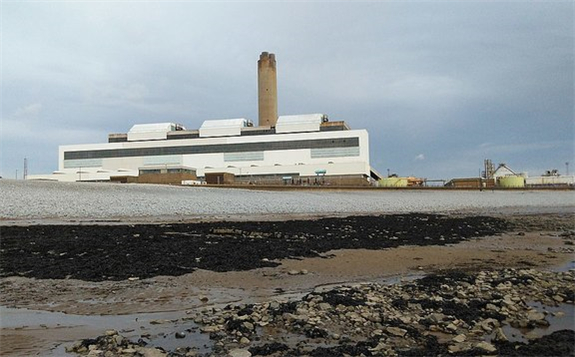
The last remaining coal-fired power plant in Wales is to shut down next year, after energy firm RWE today announced "challenging" market conditions for UK coal power meant its 1.5GW Aberthaw B facility was no longer economically viable.
The facility, which employs around 170 people, will close on 13 March 2020 after almost half a century of operation. Talks with affected staff and employee representatives are set to start immediately, RWE said.
Roger Miesen, CEO of RWE Generation, said it had been clear for some time that market conditions for coal power in the UK had been challenging, with climate change policies and increased competition from clean power sources such as wind and solar heavily impacting profitability as the UK shifts towards a low carbon energy system.
"This is a difficult time for everyone at Aberthaw Power Station," he said. "However market conditions made this decision necessary. I would like to thank all of our staff, past and present, who have contributed to the success of the station for so many years. Over the coming months we will complete the consultation process."
RWE said Aberthaw's existing capacity market arrangements for this year and 2020/21 would be transferred to third parties "and a small proportion to other units" within its fleet, which it stressed would leave the total amount of UK power capacity available through the market at the same level.
Tom Glover, chief commercial officer at RWE Generation, emphasised the firm would "remain an important player in the UK energy market" due to its gas and biomass portfolio.
RWE's decision leaves just four coal-fired power plants still in operation across the UK, as domestic carbon pricing policies, rising CO2 prices in the EU emissions trading system (ETS), and plummeting costs for cleaner energy sources continue to hit coal plant profits hard.
The UK aims to close all remaining coal plants by 2025, and as a result coal power has been falling off the grid as renewables and gas power pick up the slack. Earlier this year the UK went its longest period since the Industrial Revolution without using any power from coal at 18 days and six hours, and records are expected to keep on tumbling in the coming months and years.
As a result UK coal plant operators have moved to shutter loss-making sites. Last month SSE said it would close its 1.96GW Fidler's Ferry facility in Cheshire by the end of March next year. That followed EDF Energy's decision to close its 2GW Cottam coal plant in September due to tough economic conditions for coal.
The UK now has just four remaining coal plants in operation, including EDF's 2GW facility in West Burton, Uniper's 2GW Ratcliffe-on-Soar plant in Nottinghamshire, and the 560MW Kilroot facility near Belfast, which was recently sold to a subsidiary of Czerch firm Energetický a průmyslový (EPH).
Drax, meanwhile, is set to convert the remaining coal-fired units at its Yorkshire power station to run on gas and battery power, which would make the UK energy firm coal-free within the next several years.
The latest news comes as official government statistics last week show fossil fuels - including coal, gas and oil - are now contributing their lowest ever level of energy to the overall mix, as the UK continues its transition to a low carbon economy in pursuit of its recently-adopted 2050 net zero emission goal.
However, campaigners have warned the country remains off track to meet its emissions targets and are arguing that with coal power due to be fully phased out the government now needs to come forward with a more ambitious plan to end the use of unabated gas-fired power plants.